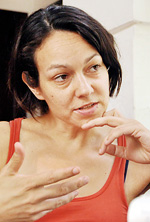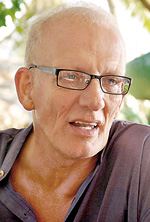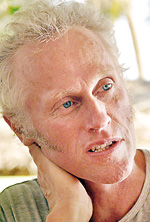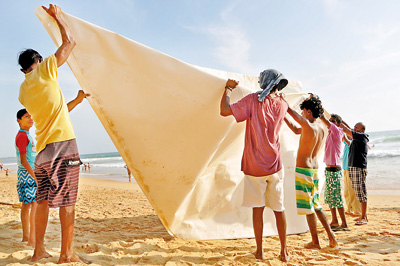Making waves on a paper boat
View(s):
Bye bye: Frank takes off. Pix by Indika Handuwala
Interaction is the key word of Moving Out, a residency theatre performance that works with locals where-ever they go. Duvindi Illankoon was on board to witness one of their ‘productions’ in Hikkaduwa
It’s 6 p.m. and the Hikkaduwa beach is packed. Both tourists and locals are running behind a man, his entourage, and a larger than life paper boat. Frank Bolter is in full suit to mark the occasion-he’s about to get in the boat, and his friends will push him out to sea. Then we’ll all cross our fingers and hope for the best. The anticipation is palpable.
The paper boat sinks, eventually. A few minutes after the launch it begins tilting at the side, and will only stay upright with the protective circle of fishermen and surfers who have surrounded it, cheering its occupant on. Unable to withstand the exceptionally choppy waters of the Hikkaduwa sea it tosses and turns until Frank is sitting on little more than a flattened load of paper. The crowd laughs uproariously, but he doesn’t.
“It’s not about what happens to the boat at sea,” he tells us later, once he’s washed the sand off his hair and cleaned up the debris. “I’m interested in how building it brings people together. I was giving people the chance to intermediate and get involved.” Indeed, from 2 p.m. Frank has been on the beach with his fishermen friends, whom he has been in cahoots with since he began his Moving Out residency a few weeks ago. They are joined over the course of the afternoon by a growing number of surfers, tourists and curious locals.

Elizabeth Wildling
By 5 p.m. everyone is on board, crafting the waterproof paper using origami techniques into a reasonable approximation of the paper boats we used to make as children. For Frank this is just proof that there really is nothing keeping us from interacting with each other, no matter how different our backgrounds are. The German artist has been making life-size structures out of paper and board for a few years now (he built a house in a village and then lived in it for a month and crafted a racing car with a team) and each time his social experiment has brought all sorts of people together. Does he ever worry for his safety, sailing a paper boat in the open sea (and once memorably down the Thames)? “Not really,” he shrugs.

Neil Butler
Frank was one of six artists and performers at Moving Out, a festival of theatre and performance art that happened in Hikkaduwa from January 30 to February 1 (and later this week in Colombo from February 6-8). Over three days these performers took to the beaches, jungles and streets of Hikkaduwa to share the fruits of their six week residency programme at Sura Medura, spearheaded by Artistic Director Neil Butler. “I’m very pleased with what they’ve achieved,” says Butler. “They interacted wonderfully with the locals, and got everyone involved-which was what we wanted to do from the start.”

Alex Rigg
A quick walk from the Sunbeach Hotel, where the festival was based, brings us to Sura Medura where the six performers-Frank Bolter, Alex Rigg, Adrian Schvarsztein, Elizabeth Wildling, Kitt Johnson and Rodney Branigan-have been living and creating over the last few weeks. Here we find Elizabeth, a visual artist who works primarily with video to experiment with light and shadow. Elizabeth leads us to the top floor of the house, to explain why the building itself has inspired her work. “The house makes its own photographs,” she points at the reflection of a coconut tree created by the harsh afternoon sun on the windows.

With a little help from my friends: The fishermen pitch in
Working in Sri Lanka has been a challenge, she reveals, but it has also led to a lot of work in progress. “Light is very dense in Sri Lanka, and dawn and dusk happens quite fast so capturing the different effects so quickly is not easy,” she says. Her performance at Moving Out was different from the others’-it didn’t involve as much interaction, although she did invite a group of people into their residence to observe her video installation.
Alex Rigg, a Scottish artist has spent the last few days performing to an unsuspecting Hikkaduwa public. Alex makes it his task to unearth “truths” with his performances. “There’s no guarantee that I’ll find it,” he deliberates. “But it’s an interesting process.” Alex’s performances in Hikkaduwa varied from day to day, and when we meet he’s busy making a length of rope with coir he obtained from the village. He obtained it during his act, while observing people’s reactions and wondering if the dogs circling him were as friendly as the locals. “They were,” he smiles.
Catch the last day of Moving Out today (February ![]() from 6-8 p.m. at the University of Visual and Performing Arts. The festival is organised by UZ Arts. The programme has been created with the support of In Situ and their European Abroad fund, EUNIC Sri Lanka (consisting of the British Council, Goethe Institut and Alliance Francaise), the University of Visual and Performing Arts and local businesses.
from 6-8 p.m. at the University of Visual and Performing Arts. The festival is organised by UZ Arts. The programme has been created with the support of In Situ and their European Abroad fund, EUNIC Sri Lanka (consisting of the British Council, Goethe Institut and Alliance Francaise), the University of Visual and Performing Arts and local businesses.


